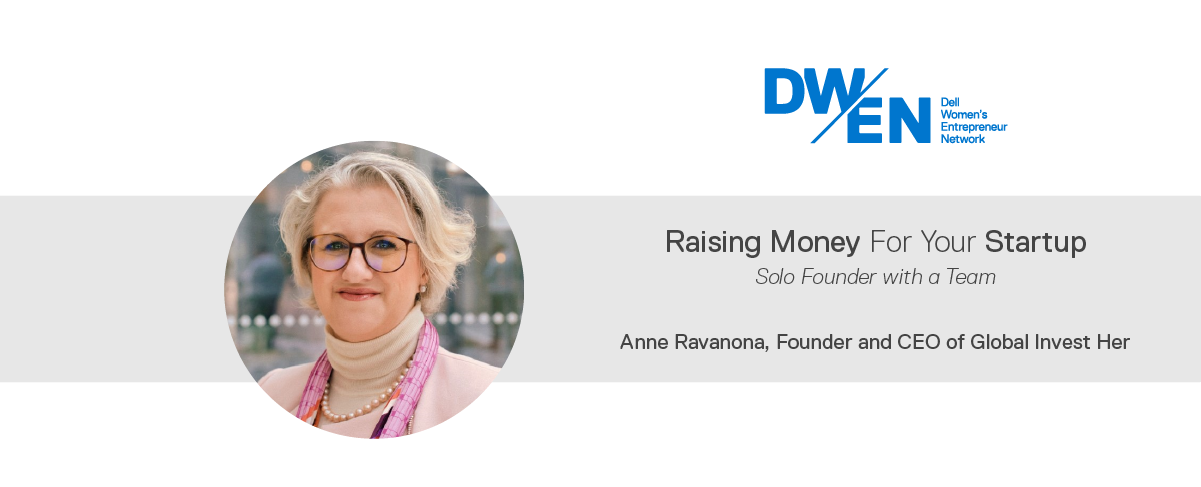
Esta minissérie ajudará você a entender como suas necessidades e fontes de financiamento podem mudar em diferentes estágios de sua jornada à medida que você constrói e expande sua empresa. Nosso especialista em financiamento Anne Ravanona, fundadora e CEO da Global Invest Her, compartilha uma variedade de opções de financiamento, práticas recomendadas e dicas importantes para ajudá-lo a navegar em sua jornada de financiamento em cada um desses três estágios principais – como solopreneur, como solopreneur desenvolvendo uma equipe e como uma startup pronta para crescer ou escalar.
Raising Money For Your Startup (Solo Founder With a Team)
(Part 2 of a 3-part series)
Building on our previous blogpost, Como arrecadar dinheiro para sua startup como solopreneur em estágio inicial, let’s continue your journey in the world of raising funding, from the viewpoint of a solo founder growing your team.
Como é esse estágio, em geral?
You have successfully set up your company as a business entity and no longer see yourself as a freelancer or solopreneur, rather an entrepreneur who has now hired people into your team full time, with maybe some other team members who work with you part-time or on a contract basis. Even though you may not have a co-founder, you may be testing some of your full or part-time team members to see if they are co-founder material. Or you may be very happy still being the solo founder with the final say on all decisions, while leaning on team members to take care of some of the key tasks you used to do. This is the beginning of starting to scale your company, as now team members who can keep things going if you need to take time out of the business for any reason. Potential funders/investors will certainly look at you and the viability of your business differently, which can positively impact your ability to raise funding.
Quais são as realidades e desafios nesta fase? Qual é a sensação?
 All these phases can be quite exhausting for the solo-founder who is still very much the go-to person, despite building out a team (until you have enough team members to warrant a HR person, who will certainly make things easier for you). And all of this, on top of your key job in keeping customers happy, expanding your revenue, managing the finances and searching for new sources of funding. Sound like you?
You are now officially a ‘three-headed leader’ (manager, operator and strategist all at once) and a key part of your job description is definitely finding more funding to fuel current and future growth. Learn to make time in your busy diary for networking with fellow peers, going to industry events, pitching, meeting and building relationships with investors because building relationships, getting more visibility for yourself (your personal brand) and your company, are vital to attracting more customers and potential investors.
All these phases can be quite exhausting for the solo-founder who is still very much the go-to person, despite building out a team (until you have enough team members to warrant a HR person, who will certainly make things easier for you). And all of this, on top of your key job in keeping customers happy, expanding your revenue, managing the finances and searching for new sources of funding. Sound like you?
You are now officially a ‘three-headed leader’ (manager, operator and strategist all at once) and a key part of your job description is definitely finding more funding to fuel current and future growth. Learn to make time in your busy diary for networking with fellow peers, going to industry events, pitching, meeting and building relationships with investors because building relationships, getting more visibility for yourself (your personal brand) and your company, are vital to attracting more customers and potential investors. O que você deve saber sobre como arrecadar fundos nesta fase, como solopreneur?
Whereas investors may be concerned about the scalability of a one-person operation, now you have built a team and are growing your company, looking for pre-seed – series A capital will be different. Most investors like you to start connecting with them very early on, so they can see how you execute on what you say you will do, and see what traction you create with limited resources.
Algumas dicas gerais importantes nesta fase:
- Continue to build and get funding advice and contacts from your advisory board to build relationships with other potential investors/sources of funding
- Focus on building strong internal processes and a company culture with clear values, objectives and code of conduct to make it easier to on-board new team members, continuously improve how you do things and increase efficiency.
- Be sure to invest and use key tech tools to work efficiently with your team, investors and external partners such as slack, Monday.com, Airtable, Calendly, or Zoom.
Quais fontes de financiamento os fundadores normalmente usam nesta fase?
Here are some of the sources of funding I’ve seen hundreds of women founders use at this stage of building their company and some key insights to help you consider them:
Non-dilutive sources of funding (where you don’t give up any equity):
Business Credit Cards: use your company credit cards from time to time to manage company expenses and potentially make some adhoc big purchases on credit while waiting for more revenue to come in. Most credit cards offer rewards for using their cards with specific partners, so make sure you get your reward points to clock up air miles, hotel nights and other perks to continue to remain lean and manage your monthly burn rate.
Subsídios are a great way of funding your business. They are mainly perceived as ‘free money, yet they require a lot of paperwork, reporting and time. You may get grants to do feasibility studies, carry out research or for to develop very technical/health tech types of companies. Many grants expect you to pay the expenses upfront and submit receipts for reimbursement afterwards so make sure you have enough cashflow to cover the time you are waiting for reimbursement. Research local, national and international grants, including from big corporations like Google for Startups, Cartier Women’s Initiative and make sure you use the Dell Grants Office services to help you identify and apply for the right grants at this stage.
Bank Loans: if you have a steady income coming in, or other forms of collateral you may qualify for working capital or business loans from your local bank. It’s normal to have some forms of debt funding in your business and they allow you to hold on to more equity. Explore loans from different banks, not just the current business bank you are with, and ask other founders who got loans there about the rates they negotiated to increase your bargaining power.
Competições de campo: most pitch competitions offer prizemoney which is essentially free money, no strings attached as well as other perks such as products, mentoring or learning. Take time to strategically choose the pitch competitions you will go for this year, to get you in front of the right investors you are targeting or increase your visibility to key customer groups. Be sure to check out the pitch resources from the DWEN Funding Hub below to help you have more success when pitching potential investors.
Customer revenue: The best form of funding is a paying customer. Focus on getting paying, returning customers, so you’ll have enough cashflow to build runway. Investors at this stage will really look at your revenue as signs of traction and potential, so focusing here not only gives you more financial stability, you’ll have more leverage when negotiating term sheets with potential investors. Always explore other types of customer segments or countries to increase your revenue streams. Remember to look at relevant government contracts you could service too.
Revenue financing: If you have steady, growing revenue streams, you can look into getting revenue financing (where you give up a % of future revenue for equity) or factoring, where you ‘sell’ customer invoices (mainly with big corporates or government contracts) at a discount in order to receive immediate cash. The buyer of the invoice, known as the factor, takes on the risk of collections and usually charges a fee for this service. Both can be interesting, especially if you need money upfront to pay for production runs or manage cashflow, while waiting for big clients to pay.
Donation or Rewards based Crowdfunding: Donation crowdfunding is where people make a donation to your cause without expecting something in return – usually good for social enterprises and non-profits. Rewards based crowdfunding sites help you raise money for a product or service you are building. These types of crowdfunding can be great sources of funding and help you prove a market, engage your community and inject some cash in your business. Remember that preparing a good crowdfunding campaign takes at least 3 months preparation and a lot of dedication and time to make sure you reach your target.
Pre-Sales: offering your customers to pre-buy something from you or buy a voucher in advance at a special price, are great ways for you to fund production runs of your product or service or test real demand for what you are building before your build it. Make sure you deliver that version of your product though, and don’t over promise. This was a very successful tactic for service businesses during Covid 19 lockdowns, where people could buy vouchers for services and use them once things opened up again. A good tactic to have up your sleeve.
Dilutive sources of funding:
Equity Crowdfunding: equity crowdfunding campaigns allow you to offer a limited amount of stock to many potential investors, most of whom you don’t know. This can be a good way to raise funding while proving customer traction and building your community. The equity crowdfunding platform will make you go through due diligence and charge you a commission on the amount raised as well as a fee for managing the legal documents post raise, so be sure to factor that in. You’ll still need to prepare at least 3 months in advance, and it will be up to you to drive traffic to your campaign and bring your community, so make sure you factor that time into whether or not you’ll choose this source of funding.
Accelerators: There are many accelerator programmes out there, so be sure to choose the ones that are sector specific and will bring you the best return on your time there. You’ll need to choose some key team members to come with you, while still building your business in parallel, which will be challenging and exhilarating. Remember they can take anything from 5-15% equity, some make you pay for their programmes so make sure they are a good fit. Get as much feedback from founders who have been on that specific programme to help you decide. Most accelerators offer demo days at the end, where you pitch to their investors and many founders go on to raise significant money. Many women founders I interviewed who successfully raised several rounds, have been through an accelerator programme. Investors like founders who go through accelerators as they can help de-risk key parts of the business model/product/service and most investors see accelerators as a key pipeline for potential investments.
Angel Investors / Syndicates: Angel investors are individuals or syndicates (groups of angels that co-invest together), that invest their private money in companies. Many angel investors want to be more or less active in helping you and all expect a return on investment. Make sure you choose your angels well – learn more from our DWEN Funding talks below to hear from real angels.
Early stage VCs (venture capitalists): venture capitalists are professional investors investing money they have raised in a fund, who need to give outsized returns to their own investors. They usually only invest in high growth companies and sectors. There are more and more pre-seed and seed vcs out there, so be sure to start building relationships with them, even if you are too early for them now. If they give you a No, make sure you get precise feedback from them about their reasons and also ask for at least 3 other vcs you should talk to who could be interested. Remember, VC is not for everyone, so make sure you are on the trajectory to become a high growth company in a high growth sector with over $1B+ market size, before you approach them.
You’ll need to choose the right sources of funding for your company from the above funding menu, that fit the stage you are at. Remember above all, that raising funding takes 3-12 months and will require a lot of your time as CEO, so make sure you set up your colleagues to keep things moving while you fundraise in parallel, to ensure a greater chance of success.
Principais recursos do Funding Hub que podem ajudá-lo nesta fase:
- Funding Series Part 2- Where to Look for Funding
- Funding Series Part 3- The Funding Journey of a Dwen Member in AI
- O que os investidores querem saber antes de investir
- DWEN Funding Talks- Funder Tips and Tricks to Help you Fund Your Business in USA, EMEA and India
- Acesso a bolsas de tecnologia para o seu negócio
- Pitch Tips and preparation:
Check out the Dream Tech contest to win tech solutions from Dell.
You may also like: Check out the Funder Directory from Global Invest Her a global directory of women founder friendly sources of funding, to help you do your funder research and find the right funder faster.
The journey from solo founder with a team to scaling your company is the next step in the journey. In part 3 of this 3-part series, you’ll learn what to look out for and which sources of funding are adapted to founders growing or scaling their companies. See you there!
Access Part 1: Como arrecadar dinheiro para sua startup como solopreneur em estágio inicial
Sobre Anne Ravanona & Global Invest Her
Anne Ravana, fundador e CEO da Global Invista Ela, e nosso parceiro e autoridade do setor em nosso Centro de Financiamento DWEN, tem a missão de conseguir financiamento para um milhão de mulheres empreendedoras até 2030. Ela é uma defensora apaixonada das mulheres e uma autoridade reconhecida no financiamento de mulheres empreendedoras. Através do seu trabalho na Global Invest e da sua liderança como delegada da UE no G20 e no seu grupo de trabalho Women20 (W20), Anne trabalha incansavelmente para mudar o jogo do financiamento, ajudando as mulheres empresárias a obter financiamento mais rapidamente.

